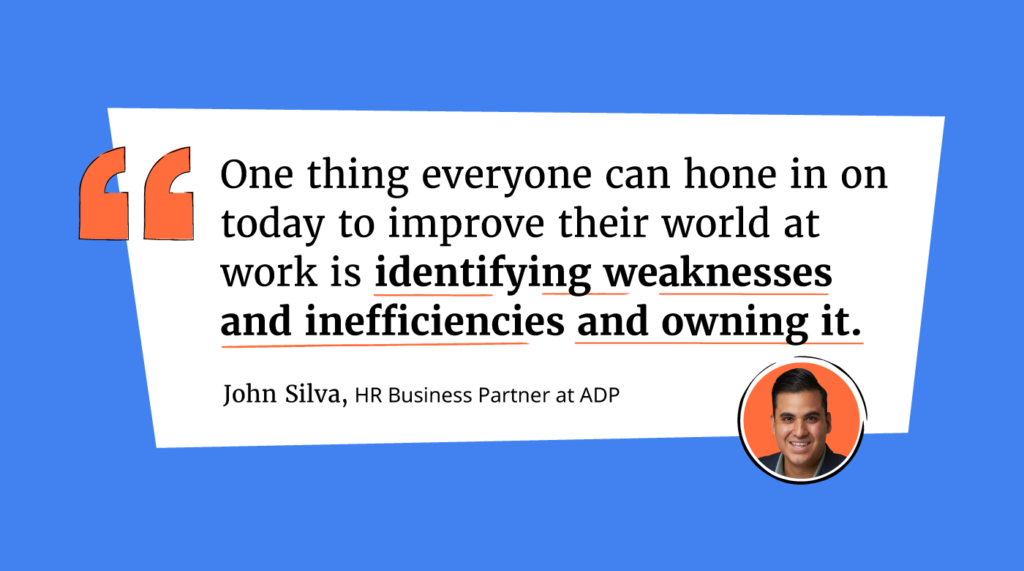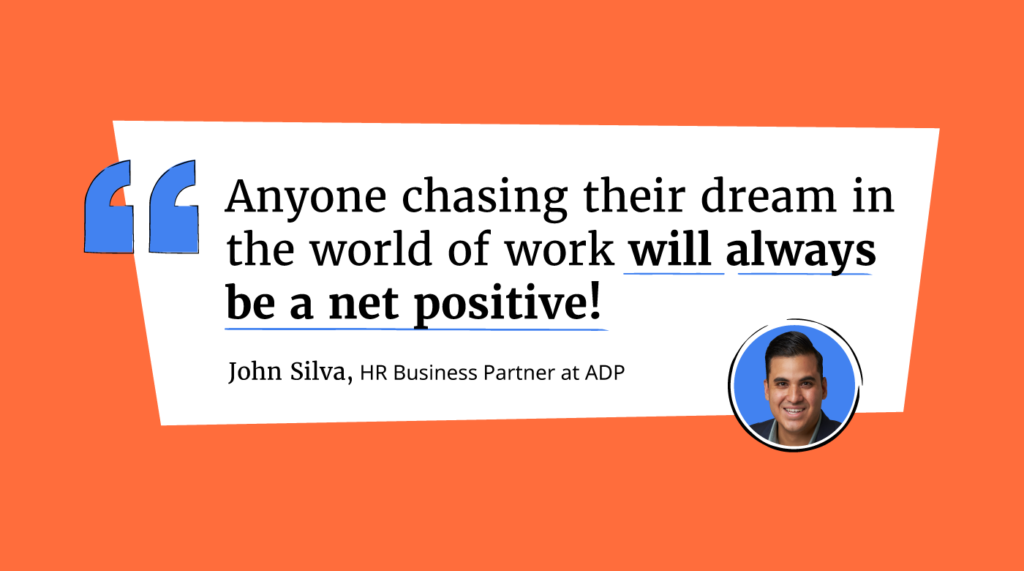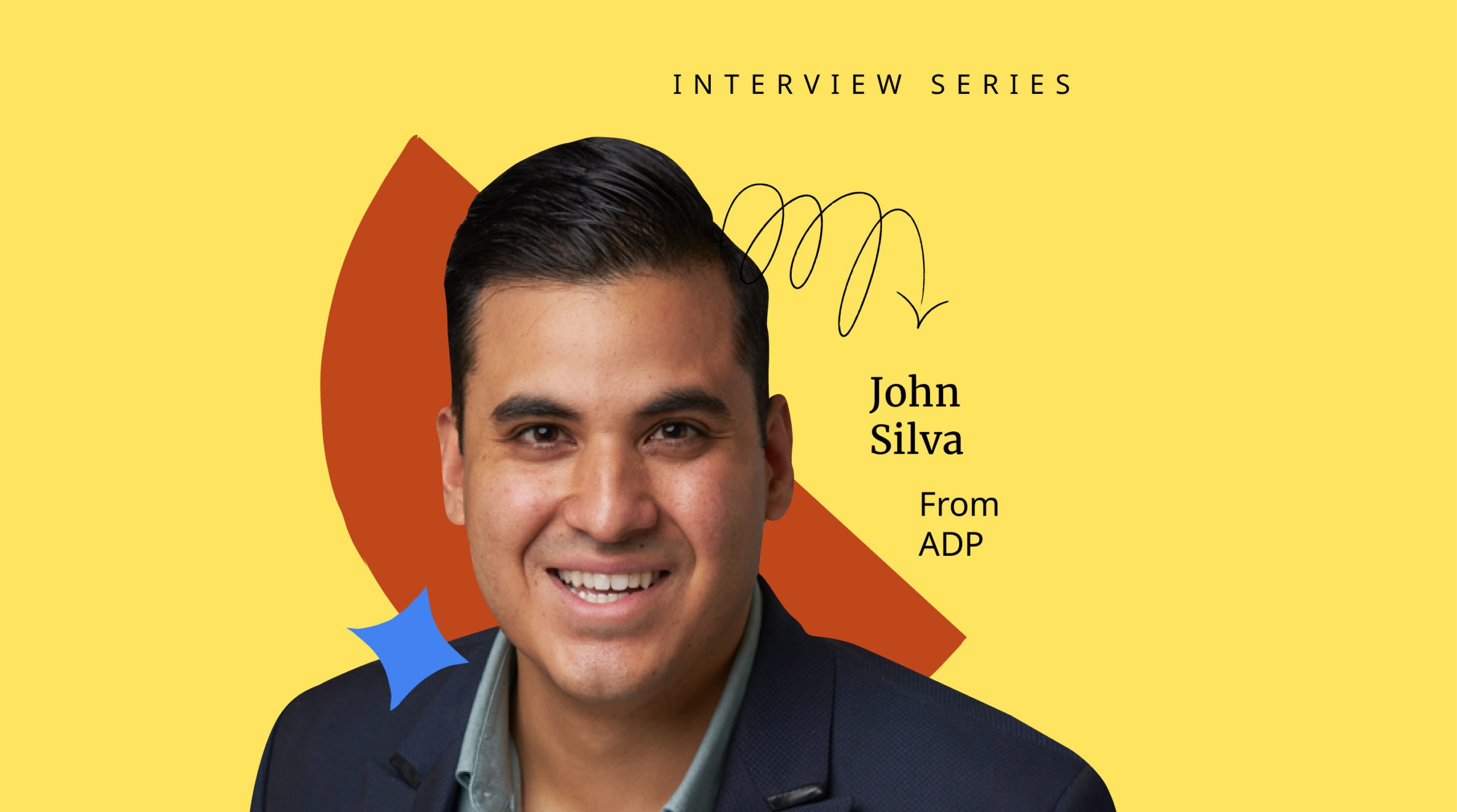We’re passionate about the world of work, and how we can make it better. To help satisfy our curiosity, we’ve launched an interview series where we pick the brains of experienced leaders, business owners, managers, and individual contributors to get their thoughts on how we can collectively build better.
We’d love to get to know you a bit better, tell us a bit about your backstory.
Hi there, I’m John Silva, SPHR! I’ve been in the HR space for over 7 years. I’ve mainly focused on consulting/PEO model for the SaaS and Startup spaces here in Phoenix, Arizona. My company background includes PayPal, Zenefits, Sequoia Consulting Group, and currently ADP.
My love for HR came from watching my parents run a small, 5 person business as a kid and recognizing the pain and everyday struggle it is to run an organization. I made it my mission to help small businesses focus on that growth and to also look out for the HR landmines and hazards we encounter every day.

If we were to ask a friend to describe your personality to us, what would they say?
Friends and co-workers would label me a lighthearted and fun person to be around that asks in-depth questions. They note that I often practice the “reasonable person standard” to all of life's challenges. They come to me knowing I can empathize and see what it’s like in other peoples’ shoes but also understand nuance and vague situations.
Thinking back to your career journey, what’s an interesting story that stands out?
Of the encounters with leadership, employees, and clients, I can recall one specific Manager at a Consulting Firm that I worked at. For the purposes of this story I'll call her “Jessica.”
I was working at a small Consulting firm here in Phoenix, no more than 9 employees. It was easy for all of us to be in the office on Fridays and meet for lunch. Talk about our clients, talk about life, and just get to know each other more. Over time, we found that Jessica was on the “half-empty” side of things when it came to life's problems.
On these Friday meetings we would do what’s called “what’s making me happy this week.” A fun and simple exercise to talk about a book, tv show, or event that you enjoyed in the week. It was normal to turn to Jessica and ask her what was making her happy and for her response to be “Nothing, nothing made me happy this week” or “between all the terrible things I dealt with I can’t imagine anything good.”
This approach to life made me realize how I did not want to lead people if I became a leader in the workplace. So many posts on Linkedin will tell you things your Manager did that was inspirational or moving. It’s equally important to observe traits you encounter that you would not want to adopt. Most importantly, how your attitude can affect not only yourself but your whole team.
What’s the most impactful lesson you've learned over your career thus far?
Most HR people encounter a slew of different life experiences and challenges to pull from! Of all the experience I had - I would say the most impactful was working for a startup SaaS company as a young employee here in Tempe, Arizona. What was the lesson? It’s a long-winded answer, but I'll get there.
Working for this start-up I was surrounded by employees my age and my experience level. As a result, we committed to our work, bonded as teammates, but more importantly, we gave it our all to grow our careers. I was at this SaaS for just 2 years! In those two years I wanted multiple promotions, I wanted pay raises, and I wanted recognition. Why? Because my peers were receiving these and I was working 10 hours (often 12) a day to hit our metrics and goals.
Over time, my leadership could not commit to my demands, they laid off my friends, and I found that monetary increase and status in future roles.
So what’s the lesson? The lesson was this: recognize that after all the personal equity you put into your job and how much you feel you’ve invested in that work - at the end of the day employment is a business relationship. That’s how employers see it!
The analogy I give employees and clients is this: You hire a plumber to work for your plumbing company. He comes in every day and talks about his dreams of being an architect. He is good at his job as a plumber but comes to leadership expecting next steps in his architectural journey. As that plumbing company, you can only do so much to achieve his architecture dreams, and at the end of the day, you just need a simple plumber to do plumbing-related duties!
Thanks for giving us some insight into who you are! Let’s jump into things. When you hear the phrase “build a better world of work”, what comes to mind?
When I hear “build a better world of work'' I think of the fundamentals: good organizational design across functional groups, a clear scope of service for both the employees and the product they support, a healthy span of control for leadership, and a clear vision for employees to see what their career trajectory could be in the organization.
It’s easy to aspire to stretch goals, sales metrics, and organizational design. However, are we doing the fundamentals correctly? Do employees know how well they are performing? Is their role clear and easy to understand? Are they being managed in the style that suits them best? It’s key to focus on the fundamentals and do them at the highest level so that as you grow as a company they are sound and ideal for scaling.
For you, what’s the main blocker you see as standing in the way of building a better world of work?
The main blocker in my eyes is the daily struggle of optimizing the Employee and Manager relationship. I do believe that employees quit their boss, not the company. Are employees bad? Or are they just paired with a leader that doesn’t know how to manage them? Do Managers know how to manage these employees? Is the Manager new to leadership? So many factors come into play that each relationship should be seen on a case-by-case basis. Employees will tell you that they stayed at a company (and even followed) the Manager they had because it was such a positive experience. Employees will also tell you the main reason they quit was for that same Manager.
What’s one thing within our control that we can practically do to build a better world of work today? And, how do you recommend going about it?
One thing everyone can hone in on today to improve their world at work is identifying weaknesses and inefficiencies and owning it.

Do you have a great product but it takes longer to ship and deliver than your competitors? Set that expectation with not only your customer, but the team supporting the customer. Have a great overall product but the software or system is not as up-to-date as its competitors? Take ownership and acknowledge. One of the greatest tools we have that we seldom take is owning the things we’re not the best at. It’s hard! It takes a level of accountability and it takes self-awareness.
How do you drive a culture of ownership?
A culture of ownership can have many different forms. A key component for any culture of ownership is having top-down style ownership. Having Executives and Senior leadership show ownership is essential if you want success to waterfall to your frontline employees. Another great strategy for ownership is providing employees a chance to solve their own problems. Usually, employees working day in and day out on the product/functional group they support know the best way to work around or root cause pain points they experience regularly.
Can you share one thing you’ve experienced, seen, or read about that is leading us towards a better world of work?
One thing I've seen with the era of COVID is employees recognizing they are not doing the work they truly want to do and quitting for a fresh start. Accountants who have been doing the same role for years finally giving Graphic Design a shot. Employees in Sales wanting to try CyberSecurity. These career changes are exciting and should be fostered by companies in today’s age. Anyone chasing their dream in the world of work will always be a net positive!

I’m curious, thinking about building a better world of work, is there a company and/or leader who stands out to you as someone we should follow? If so, what are they up to?
I always recommend folks to Lazlo Bock! He’s the author of Work Rules and has been a Senior Executive at some of Silicon Valley’s greatest companies. He’s a great follow because he has a great pulse on the “Everyday Employee” rather than the 30,000 ft scope that we’ve come to expect from Executives.
How can our readers follow your work?
Follow me on linkedin! John Silva, SPHR out of Tempe, Arizona.
Thank you for adding your voice to People Managing People’s interview series on How to Build a Better World of Work!
Add Your Voice To The Conversation
Join our interview series and share your ideas for how we can build a better world of work!
Related Reads:
- Measuring Chaos Tolerance Will Help Us Build A Better World Of Work
- Reassessing Productivity To Build A Better World Of Work
- Miscommunication Is Holding Us Back From Building A Better World Of Work
- Building A Better World Of Work Starts With Self Awareness
- Flexibility Will Help Build A Better World Of Work

